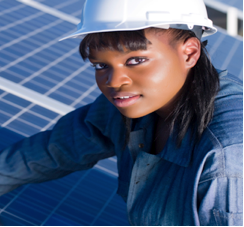COP21 implications for implementing mitigation activities
Friday, February 5, 2016 at 10:00-11:30 AM EST
Register for the webinar here.
Gender mainstreaming in the energy sector is taking place from national policies, to institutional reforms and project development, increasing energy access and providing low emission development pathways for many around the world. It has been a central pillar of the commitments towards achieving universal access to modern energy and recognized as a cornerstone within the Sustainable Development Goals. Efforts at integrating gender considerations into climate change and the renewable energy sector have advanced over the years, with most of this progress taking place in small scale, community-based projects.
However, 2015 has seen an important shift towards the increasing gender mainstreaming in mitigation initiatives, with an in-session workshop on gender-responsive mitigation and technology development and transfer technical workshop and close to 40 percent of Intended Nationally Determined Contributions (INDCs) referencing women and gender as key considerations for implementation of activities. With energy production and consumption accounting for two-thirds of greenhouse gas emissions, relying on low-carbon (emission) energy sources, renewable energy options, and energy efficiency will be necessary in order to achieve both environmental protection and support the achievement of socio-economic goals, including gender equality.
The webinar will be moderated by Ana Rojas, Gender and Energy Task Manager, IUCN GGO, and will include the following speakers and topics:
COP 21, INDCs and future implementation tools
Alexander Ochs, Worldwatch Institute
Gender Mainstreaming in the UNFCCC framework
Fleur Newman, UNFCCC Secretariat
Gender mainstreaming and the implications of COP21
Lorena Aguilar, IUCN Global Gender Office
Speaker biographies
Lorena Aguilar is the International Union for Conservation of Nature (IUCN) Global Senior Gender Adviser and head of the Global Gender Office, a position she created and has held since 2002, following more than a decade with IUCN. She has more than 30 years of experience in projects and initiatives at all levels involving public policy development, building local institutions, and the incorporation of social and gender issues into sustainable development efforts. She has vast experience providing assistance to international organizations, governments, and universities on gender policy, gender equality, and women’s empowerment, as well as on water, forests, environmental health and disaster risk reduction. Her expertise serves hundreds of partner organizations and has transformed the institutional identify of IUCN itself.
Fleur Newman is an international and environment lawyer by background. She is currently a programme officer in the UNFCCC Sustainable Development Mechanisms programme and UNFCCC Gender Focal Point. Fleur is also the lead officer for the Gender and Climate Change agenda item under the COP and SBI. She is responsible for leading the implementation of the secretariat’s gender equity strategy and action plan and manages the secretariat’s participation in the UN SWAP; which acts as an accountability framework for advancing the role of women and mainstreaming gender in the secretariat’s work under the Convention and its Kyoto Protocol and, going forward, work under the Paris Agreement and decision.
Alexander Ochs is a climate and energy policy, regulation and governance expert. He is the Senior Director of Climate and Energy at the Worldwatch Institute in Washington, D.C., where he leads a growing team of researchers and is a member of the Institute’s management team. Over the course of his career, Alexander has been engaged on climate and energy issues at the highest level of decision-making in all major world regions. His areas of expertise include climate, energy and environment policies of corporations, municipalities, provinces, countries and regions around the world. In 2010, he developed a methodology to design development pathways that are economically, socially and environmentally sustainable and can be applied by applied at any level, from local to global.
The Gender Equality for Climate Change Opportunities (GECCO) initiative is a five-year program launched by USAID and IUCN’s Global Gender Office in 2014. GECCO’s overall goal is to leverage advancements in women’s empowerment and gender equality through, and for, the benefit of climate change and development outcomes. Through its series of webinars, GECCO aims at increasing knowledge and sensitization of key stakeholders in the energy and mitigation sectors as a means to advance women’s empowerment.
To register for the webinar please go here: https://attendee.gotowebinar.com/register/5124295204175616770
The GECCO team will be happy to provide you with our support prior to and during the webinar.
For technical and communications/outreach questions, please contact Maggie Roth (maggie.roth@iucn.org). For content questions please contact Ana Rojas (ana_v_rojas@hotmail.com)







